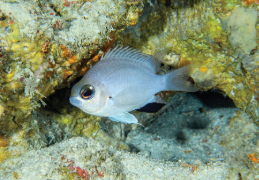New Damselfish Species Discovered in Maldives
A team of scientists has identified a new damselfish species, that occurred near the Maldives, published in the journal ZooKeys. It marks the importance of deep-sea coral reefs, which are often overlooked.
Discovery Details
The new species is named Chromis abadhah, found during explorations of mesophotic zones. These areas lie below 100 meters where light is minimal. The fish has a pale blue underside and a white top. Its average length is 6.9 cm.
Habitat and Behaviour
Chromis abadhah resides in crevices near sea sponges. This habitat suggests it may be vulnerable to predators. The fish’s two-tone coloration aids in camouflage. It blends with the dim light above and the darkness below.
The role of Chromis abadhah in its ecosystem remains unclear. Deep-sea fish often share common traits. More research is needed to understand its ecological functions.
Threats to Deep-Sea Reefs
Deep-sea reefs are less impacted by ocean acidification. However, they still face threats. Discarded fishing nets, ropes, and trash are prevalent dangers. Coral bleaching also poses a risk. Such threats affect the habitats of species like Chromis abadhah.
This discovery puts stress on the need for further study of deep-sea ecosystems. Many areas remain unexplored. About these habitats can help in conservation efforts. Protecting species like Chromis abadhah is vital for marine biodiversity.
GKToday Facts for Exams:
- Chromis abadhah – Chromis abadhah is a newly discovered damselfish species. It was found in the mesophotic zone of the Indian Ocean. Its unique coloration aids in predator avoidance.
- mesophotic zone: The mesophotic zone refers to depths between 30 and 150 metres. This area receives minimal light, making it crucial for studying deep-sea ecosystems. It remains largely unexplored and under-researched.
- ZooKeys: ZooKeys is a scientific journal dedicated to biodiversity research. It publishes studies on taxonomy, ecology, and conservation. The journal plays role in documenting new species discoveries.
Month: Current Affairs - December, 2024
Category: Science & Technology Current Affairs




